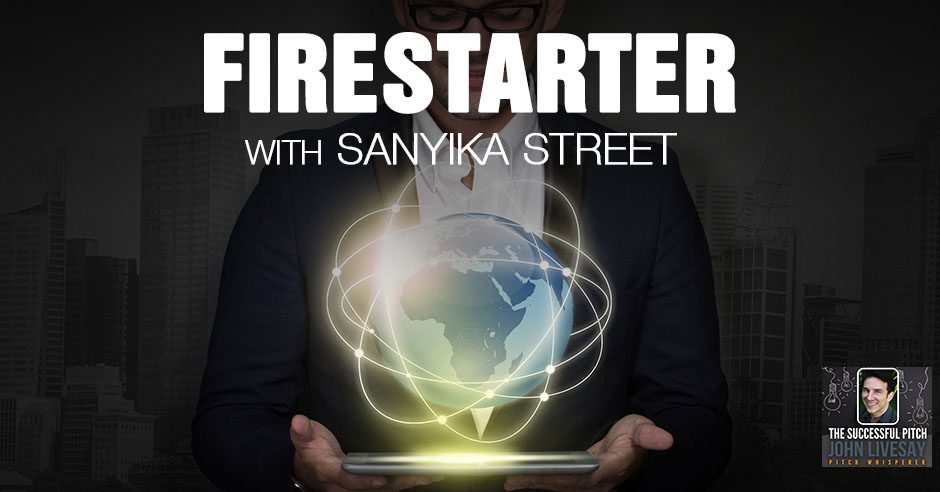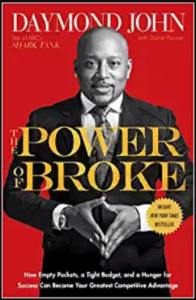Firestarter with Sanyika Street
Posted by John Livesay in podcast0 comments
 Episode Summary:
Episode Summary:
When you are writing, you have to have good human qualities. You’ve got to know how to be transparent and vulnerable and know how to collaborate. Sanyika The Firestarter believed he was none of those. Sanyika Street was originally from Washington, DC. He moved to LA to pursue a career in entertainment. At age 24, he was doing national commercials, movies and TV shows on FOX. By age 32, he had a drinking problem which left him broken. At that point, Sanyika realized that the most important thing he needed to do was to start telling his story. The first fire he lit was the light within himself through video blogging. As he started to feel better, it opened the pathways for him to move into the space of speaking and performing arts. Sanyika talks about his YHUTU approach to rebuilding himself and blazing a trail for others to follow.
Listen To The Episode Here
Firestarter with Sanyika Street
I’m honored to have Sanyika The Firestarter who is an inspirational speaker, a performing artist, and a brand spokesperson. He uses performing art, which is basically the spoken word, music, and storytelling to entertain and inspire people. I’ve seen it in person and it blows me away. He teaches people how to be an innovative leader or how to be a firestarter. He said his mission is to help one million people find their fire and use that fire to light up the world. Sanyika, welcome to the show.
Thank you for having me, John. It’s a pleasure to be here.
You have a big backstory that I want to get into. I know that you’re originally from DC and then you moved to LA, which is where we met. Take us back at the time when you moved to LA at 24 or you can even go back further. How did you become The Firestarter?

Firestarter: I’m just a writer trapped in the body of an NFL lineman.
My first name, Sanyika, means leader of his people. A firestarter is basically a leader. The truth is that I’ve been chasing my name my whole life. I think that was in my mother’s infinite wisdom, her giving me a name that I had to live up to. Somebody asked me, they said, “Are you born a leader, or do you have to become a leader?” I said, “You’re born king, you have to become a leader.” I’m born in DC. I’m the youngest of four. I’m the baby. I am bigger than everybody else. I’m 6’8″ and I weigh about 290 pounds.
As I always say, I’m a writer. I’m a writer trapped in the body of an NFL lineman. I’ve been writing and performing since I was in fourth grade doing poetry and then getting into music in my teen years. When I was about 24, I decided to pursue a career in entertainment. I did a show on Fox called The Complex Malibu when I was in DC. When I got kicked off the show, I went back to DC. I decided that I wanted to pursue a career in entertainment.
I moved to LA to pursue a career in entertainment. In my first couple of years in LA, I did about four national commercials. I did a couple of TV shows and another one on Fox. I did a movie. During that period of time I was like, “It’s going to be like this all the time,” and no. Acting slowed down and then I decided to pursue what I love to do, which is writing. I started songwriting for artists. I started songwriting for artists on Konvict Records.
I worked with artists like Nick Lachey and 98 Degrees. We did their reunion album, rappers, independent artists, rock bands, and everybody. The thing I realized is that when you are writing, you have to have good human qualities. You got to know how to be transparent and be vulnerable and know how to collaborate. None of which I knew how to do. During that period of time, I started to slip into depression. I got into a drinking problem. I’ve got two DUIs. The interesting thing about the DUIs is that I got both of my DUIs when I wasn’t even driving. I wasn’t even a successful drunk.
How is that possible? Somebody else was driving but they gave the DUI to everyone in the car?
No, I was in the car sleeping both times. If you’re in a car sleeping and you’re drunk, then it doesn’t matter. It was a dark period for me. I was in depression. The low point for me is working at this crappy production house in the valley in LA. I was working for this tyrant owner. He came up to me one day and he said, “Sanyika, I don’t want you to use your first name with clients anymore because it confuses clients.” At the lowest point of my life, this guy is trying to strip me of my identity. We were at odds. We were arguing that day. That night, I was in tears. I couldn’t believe that I’d let my life get to that point. That was the turnaround point.
[Tweet ” There is no button to click to be a leader, only a button to follow.”]
From that point is when I started to rebuild myself. The first fire I had was the Light Within Me. I started to video blog. I realized that the most important thing I needed to do was to start telling my story. I just started telling my story, video blogging. I went through a period where I wanted to pursue video blogging and doing the YouTube thing, but after getting 50 views on one video, you realize that maybe that’s not the move. I started to feel better. It opened the pathways for me to move into the space of the things that I’m doing now.
The three things that I realized is that you got to approach it on five different levels. I had to start moving into I call it YHUTU. It is start learning more about how to be Yourself, being more authentically me. I had to learn how to be H, Honest. I had to be U to be Useful, T to be Tactical and the last U is to be Unique. What happens is a lot of people start with trying to be unique and then they end up with the U. Uniqueness is not a ploy. You’ve got to find your uniqueness. They call it your unfair advantage. You have to find your uniqueness in the process of identifying who you are to the utmost degree.
The search of finding myself is where I’m at now. After going through the process of identifying who I am, I identified that my voice is a powerful voice for change. I decided to use that to inspire people and to talk about innovative leadership. There’s a sexy word that’s going around called disruption and being a disruptor. Everybody wants to sound like they’re doing something different, but nobody wants to change.
The idea is that disruption and innovation, it comes as a result of identifying your unique strengths and being a firestarter. Being not afraid to take a few shots when you go out into the world because people aren’t going to understand what it is that you’re doing. Then you’ve got to take a few shots so that you can start leading the way. Eventually, other people are going to start following your path. I speak and perform, and then incorporate those things into my work.
Being a firestarter is being authentic, honest, useful, tactical and unique. What is the distinction between authentic and unique? If you’re authentic, I would assume there’s nobody else quite like you. Doesn’t that make you unique? How do you distinguish those two?
Authenticity means connecting with who you are. It’s the who. It’s the talents that you possess, the gifts that you have. Like yourself, you’re a pitch whisperer. You’re a storyteller. You have to identify those gifts. It’s hard to be authentic because the wave is one of following what everyone else does. There’s a button that you can click online to become a follower, but there’s no button you can click to become a leader. Being authentic means identification. It’s more about identification of who you are. When you think about unique, then you can start to veer away from who you are to start to twist and refine the gifts that you have to put a unique spin or to put a reframe on them so that they can be a little bit different than what everyone else is doing.

Firestarter: It’s hard when you are in a dark period because you’re questioning your value to the world.
If you’re unique, you obviously want to be authentic. Authentic is what layers everything around that. Is that accurate?
Yes, that’s it.
You went on to create a recent campaign, Thank You for Your Service, which is a tribute to the veterans with the Department of Defense. It went viral and it has over 730,000 views. Tell us how that came about.
You and I are both members of an entrepreneur’s community. One of the things that I learned through my dark period was that I didn’t know how to collaborate. It’s hard when you are in a dark period because you’re questioning your value to the world. Your constant unquestionable value to the world is always revealed through service. As you give yourself of service, you get this thing I call executive level reflection.
When I can see my work through your eyes and you can reflect back on me whether or not the work that I’m doing is creating positive change or positive impact, that’s of value to me. When I didn’t know myself, I used to think compliments were praise. When I started to understand who I was, I understood that compliments were data. It was information saying that I’m on the right path.
As I started to offer myself to the entrepreneur’s community that we’re a part of, the community started to serve me, not the other way around. When I started to offer myself in service, then that’s what happened. That’s an important point. I’ve got a call one day from a guy named Mike Navarre who was opening a Farmers’ Insurance Agency in Beverly Hills. He randomly heard that I did spoken word and he said, “Sanyika, I’m doing this launch for this event called Suits for Soldiers, a Farmers’ Insurance initiative. I would love it if you came to my place and you help me open my place by doing a spoken word piece. I said, “Sure.” He asked me to write a piece about being a veteran. I was like, “Sure. I’ve never served in the military. It will be a challenge for me to write something about serving in the military.” That’s what I did.
I ended up serving it and writing a piece about serving in the military. I realized that I’d never served in the military. The thing about it is I realized that the powerful perspective is that most people don’t serve in the military. There’s only about a million active duty service men and women and about ten million in total in terms of veterans. When it came to us, I thought that will be a powerful perspective to share a perspective that says, “None of us know really what it means to say, Thank You For Your Service, and let’s explore that.” I did the piece for him.
We filmed it live on Facebook. I’ve got a call from another guy named Greg Bishop who runs a network called the All Warrior Network. He said this will be great for my network. We went out to a military base in Los Alamitos in partnership with the Department of Defense. They footed the bill on the entire location. We filmed it. We put it out and it went viral.
[Tweet “Networking is for amateurs. Relationships are for professionals.”]
Let’s describe what that looks like. When you say you filmed it, aren’t you in front of some huge jet?
I’m in front of a Black Hawk helicopter. We filmed it on a hangar and in that hangar, there were eight helicopters. One of the lines that sum up the whole piece is that I used to think being in the service was just tours in Afghanistan or Iraq. The truth is 85% of military jobs are non-combat. That line sums up the fact that 85% of the people who serve in the military operate in support of the infantry, the people are on the front lines.
We were in an airport hangar with mechanics. People working on Black Hawk helicopters and many of them have very thankless jobs. They don’t get any rewards or any credit, but they are in there cranking out all day making sure those helicopters run smoothly. Thankfully, they don’t get any praise or get any recognition because the only recognition they would get is if one of those helicopters didn’t work.
Would you mind giving the audience a little sample, so they’ll be intrigued to go and watch the whole thing of what it sounds like and experience your spoken word?
Thank you for your service, but what does that really mean? I never spent a single day on a battlefield. I never had to enlist and leave my life behind. I never woke up at 5:00 for Boot Camp daily grind. I never had to practice ducking a bomb blasts or risk discovering at shrapnel fields. Thank you for your service seems empty sometimes like, “Good morning,” a phrase we say to be polite.
A soldier said to me once, “I appreciate you saying thank you for your service, but do you know our sacrifice? If you want to thank us for our service, then show us the proof. There are a few good men and women need your support, but most of you can’t handle the truth. We go back-to-back tours, winters to springs, summers to fall, we guard this country. If the coronel orders the code red, you want as on that wall. You need us on that wall.”
I used to think being in the service was just tours in Afghanistan or Iraq but the real truth is 85% of military jobs are non-combat. I was just going to say, if you want to hear more about the piece then you can go watch the rest of the video. These pieces are done in spoken word music videos. We filmed them, and I do a spoken word piece. We compose and score music to it like it was a film. These are full productions.
I also heard you give an amazing talk on how to own the stage. Since a lot of the audience are people who have to pitch to get their startup funded or pitch to get new clients, what tips do you have of how someone who doesn’t do spoken word, but they could still learn some things from you about how to own the stage? Could you share a couple of those tips?
The very first thing that I think an audience wants to connect with, and this is the reason in that YHUTU process is because being yourself is the most important thing that you can do. We’ve gone from where people on movies used to have a TV voice and 50, 60 years ago, people had a TV voice and a movie voice. Now, people want to see people who are authentic.
There’s this thing that when you’re having a conversation with someone and it comes across as very natural and free flowing, you’re laughing and joking and saying, “How’s it going?” There are all these natural intonations and fluctuations. As soon as you put a camera in front of someone’s face, they immediately turn into an assassin. All of a sudden, they go cold and dark. They’re trying to find out what to do with their hands and they don’t know exactly what to do. What happens is the same thing on stage.
On stage, people get stage fright. The idea is that the most important thing that you want to do is the same person that you are when you are shaking hands, kissing babies, hugging and laughing with people in the lobby of an event that you’re going to be speaking at. You also want to do the same thing on stage. Whatever you need to do to be your most authentic self, to be you, to be the individual that you are, that’s the most thing because people want to see congruence. They want to see that the person that you are off-stage is the person that you are on-stage. Also, what it does is it shows courage and confidence. Confidence wins immediately.

Firestarter: Strategic is not about gain. It’s about creating relationships. Relationships are the most important thing.
If you show confidence on stage, you have won the crowd. They say in Gladiator, “You win the crowd, you win your freedom.” You win the freedom with your authenticity and your confidence initially. The second thing that I’d say in owning the stage is being honest. We live in the age of everyone is trying to be an expert. The video I did with Thank You For Your Service, we call a social impact campaign.
We you take one broad social issue or a worthy cause. The power of the piece is that I wasn’t pretending to be something or know something that I wasn’t. Nowadays, because of the Internet and the fact that we have access to all this information, it’s amazing that people pretend to be experts when they’re not an expert. You can’t show me how to get a million followers when you only have 500.
Let’s talk about how many followers you do have on social media. Just to acknowledge that.
I have about 1,500 on Instagram. I have about 5,000 on Twitter. On Facebook, I have about a few hundred. Everything is growing.
You’ve gotten over a million social media views with the things you’ve done.
The reason why is because a lot of people say, “I can’t do this until I get about 10,000 followers. I can’t get on stage until I get this or until I get that.” The sky is literally the limit. If you are useful and you provide value, then you can get access to partner with people who have vast amounts of networks through their social media basis because of the value that you bring to the table. That’s what usefulness is about and being tactical in that process means that you want to be able to be tactical and strategic. Strategic is not about gain. It’s about being able to be tactical to create relationships. Relationships are the most important thing. If I go out to a bar and I’m trying to meet a woman, I’m not trying to network. I want to build a relationship with her. That’s my intention, is to build a relationship. Networking is for amateurs, relationships are for pros.
It’s important that you build relationships and that’s the tactical. Meaning, you need to know what’s of value to someone else and what the things are that you’re trying to accomplish. You need to be open and transparent in delivering those things, so you can create a relationship of mutual benefit. That’s the tactical part. After you are yourself being authentic and honest in terms of what it is that you have to offer, you are useful in terms of the information that you can provide. Also, urgent in terms of being able to deliver it with some level of importance and tactical in your process, then you can figure out how to be unique. You got to be yourself before you start figuring out how to be unique.
I was watching American Idol. This guy was dressed as Michael Jackson and he looked like George Michael. I think that in his mind he thought to himself, “That’s what makes me unique. I’m going to combine two pop stars into the person that I present to the world. That’s me being unique.” Obviously, he was just trying to be two different people. Being unique is about being able to find an innovative angle or reframe that’s going to produce a lot of value. The example that I use a lot is when Al Gore started pursuing a film about how to impact the earth in a positive way. Fifteen, twenty, thirty years ago the primary way that we described it was called global warming. Everyone said, “Global warming is what’s changing the temperature of the Earth. That’s what we need to fix.”
As people started to hear about that, they would say, “Maybe it’s not warm in certain places. It’s cold.” The climate is going from warm to cold.” They realized that was an unnecessary reframe. They need it to be unique. There was a change in the terminology. They changed it to climate change. When that chant transformed, when the Earth’s dilemma was reframed into climate change, just a unique perspective, then that gave a lot of opportunity for people to frame that conversation and Al Gore did that with An Inconvenient Truth. It subsequently spurred a movement and it also made him a multimillionaire.
[Tweet “You got to be yourself before you start figuring out how to be unique.”]
Good storytellers have this arc where they were at their low and now they’re at the top. I remember watching that movie where you see him going from flying in the Air Force One as a VP to waiting in line like everybody else, go through security at an airport, and then rising back to the top, but going through a rough period. He grew the beard to try and figure out who he was, and he lost a little bit of his identity again.
I think when you look outside of yourself, whether you’re David Letterman or Al Gore, and you no longer have that show or that job and that people identify you so much, it is challenging to remember who is the real authentic self. You walk your talk. You are exactly the same person on-stage as you are off-stage. It’s inspiring to watch you. It’s inspiring to be your friend. I can’t encourage people enough to check out your website FirestarterLive.com.
They should be following you if they want to keep up on these amazing social impact videos and the videos that you’re constantly putting out amazing content on Instagram and other places. Before we get to all those last-minute details, is there any book that you would like to leave as a recommendation that’s inspired you to be authentic or anything that you think would be something that you would want to promote?
I’m going to have a preliminary manual. It’s going to be the preface to my upcoming book. It’s going to be called How to be a Firestarter. It’s going to talk about how to approach and how to embody the innovative leadership. We are moving into a new phase of leadership where we are requiring more transparency and authenticity. That’s what the blockchain is all about.
It’s about transparency and putting forward everything that it is that you’re doing so that people understand the value that you bringing to the world. It’s about creating a social impact so that it’s not about just your game but the world’s game. It’s going to encompass a little bit of art. It’s going to have a little bit of strategies and tools on how to become a better and more innovative leader and some funny quips and quirks that are just uniquely me and to make you laugh a little bit too. How to be a Firestarter, it will be available on my website, Firestarter Live which is also my social media handle as well, @FirestarterLive.
Any last thought you want to leave us with about how we can remember to be firestarters and light up our own life if we tend to lose it?

The Power of Broke
Everyone from Daymond John to The Power of Broke to Al Gore is that there’s this pivotal moment that we hit. Some people call it rock bottom, like Ryan Blair. Some people call it the fork in the road. To me, I call it the lightning rod moment. That’s your lightning rod. It’s the moment that the lightning hits you. That one in a million chance, that one in a million moment where you’re walking down the street, the percentage of a bolt of lightning hitting you is obviously very small to minimal. T
hat lightning bolt hits you and it jolts you. It pushes you back. It knocks you off your feet. What happens is that you have a choice when the lightning bolt hits you, you can stay down on the ground or you can use the fact that you got this one in a million moment so that you can build up the human being that you want to become. Embrace the moment because it informs everything afterwards and tells a story that you’re going to be able to tell on-stage or in the work that you do forever.
Sanyika, thank you so much for sharing your passion, your vision, and your incredible authenticity with us.
I appreciate that, John. It’s a pleasure. John, you are one of the most rooted in-service guys that I’ve ever met in my life. I greatly appreciate knowing you and having you as a friend. It is an inspiration and I appreciate it very much and you’re a great speaker.
Thanks.
Links Mentioned:
- Sanyika
- Thank You for Your Service
- All Warrior Network
- Instagram – Sanyika
- Twitter – Sanyika
- Facebook – Sanyika
- The Power of Broke
- Suits for Soldiers
- www.FirestarterLive.com
Wanna Host Your Own Podcast?
Click here to see how my friends at Brandcasting You can help
Get your FREE copy of John’s latest eBook Getting To Yes now!
John Livesay, The Pitch Whisperer
Share The Show
Did you enjoy the show? I’d love it if you subscribed today and left us a 5-star review!
-
- Click this link
- Click on the ‘Subscribe’ button below the artwork
- Go to the ‘Ratings and Reviews’ section
- Click on ‘Write a Review’
- JohnLivesay.com
- John Livesay Facebook
- John Livesay Twitter
- John Livesay LinkedIn
- John Livesay YouTube
